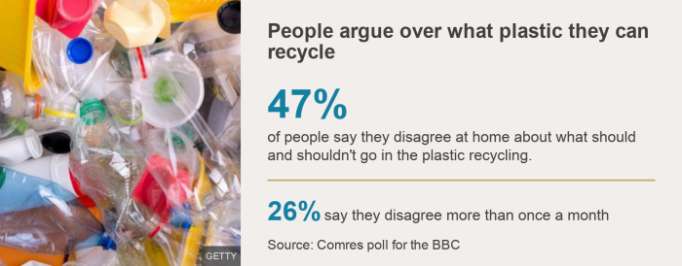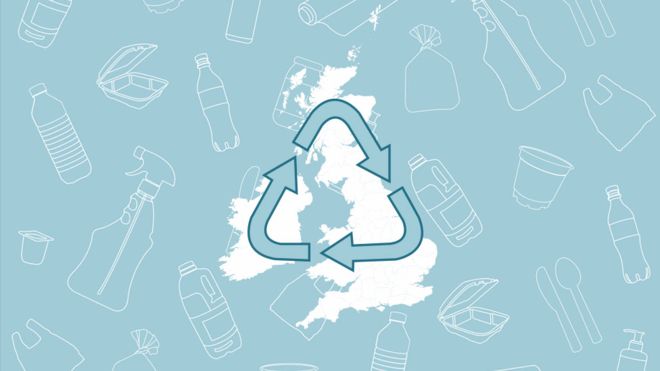What can be recycled and what can't? We are putting more plastic in the recycling than ever before - but pictures of sea life tangled in all manner of waste plastic mean the pressure is on to do more.
The government is now considering changing the way plastic is recycled in England. This is why.

Each council collects their plastic recycling differently. BBC analysis shows there are 39 different sets of rules for what can be put in plastic recycling collections:
- Most collect bottles
- Others collect pots, tubs and trays
- Some collect a much wider range

Waste plastic is collected is different ways too:
- Some local authorities collect all their recycling in one bin
- Others ask households to separate their plastics from the rest of their recycling
Councils also employ many different companies to collect and sort their plastics.
And having different recycling schemes in different areas - for example, in some areas you can recycle margarine tubs and in other areas you cannot - makes labelling difficult.

Most people in Britain regularly recycle plastic but almost half have had disagreements at home about what type they can put in which bin, a ComRes poll for the BBC suggests.
And more than a quarter have these disagreements at least once a month.

Plastic can often become too contaminated for recycling and have to be sent to landfill or incinerated instead. This happens for several reasons:
- People are confused about what goes in which bin
- People are not always very careful about what they put in
- The plastic is contaminated with food waste
- In areas where all recycling is collected in one bin, one type of waste can contaminate another

- Bottles are mainly made of PET and HDPE and these are easy to collect and recycle
- Most trays are made from polypropylene and this is pretty easy to recycle too but not all councils have access to the right facilities
- LDPE, used to make some carrier bags and cling film, is easy to process but more difficult to sort and can often be contaminated with food
- Polystyrene, used to make some yoghurt pots and plastic cutlery, is not widely recycled
- PVC makes up small amount of packaging but can contaminate other plastic recycling
- Biscuit wrappers and meat trays can be made from a mixture of many different types of plastic, making them the most difficult type of packaging to recycle
All plastic can be recycled - but it is not always economical to do so.
- Bottles attract the best prices, especially clear ones, which is why almost all councils recycle them
- Coloured plastic is less desirable because the colour cannot be removed, restricting its reuse
- Polystyrene is almost never recycled because there is no market for it
Most bottles will be sent for reprocessing in this country.
But plastic that is less valuable - about two-thirds collected for recycling - goes overseas and this figure has been rising.
Earlier this year, the National Audit Office reported the plastic sent abroad could be highly contaminated, meaning it may not be reprocessed and could end up in landfill or contributing to pollution.
Some countries are refusing to take any more of our waste.
- China and Thailand have banned waste imports
- Malaysia is considering banning imports of waste plastic
These bans are having an effect on the prices paid for waste plastic.
And this year the prices of the more contaminated plastics have fallen below zero, meaning companies are now expecting to be paid to take them away.
More about: plastic
















































